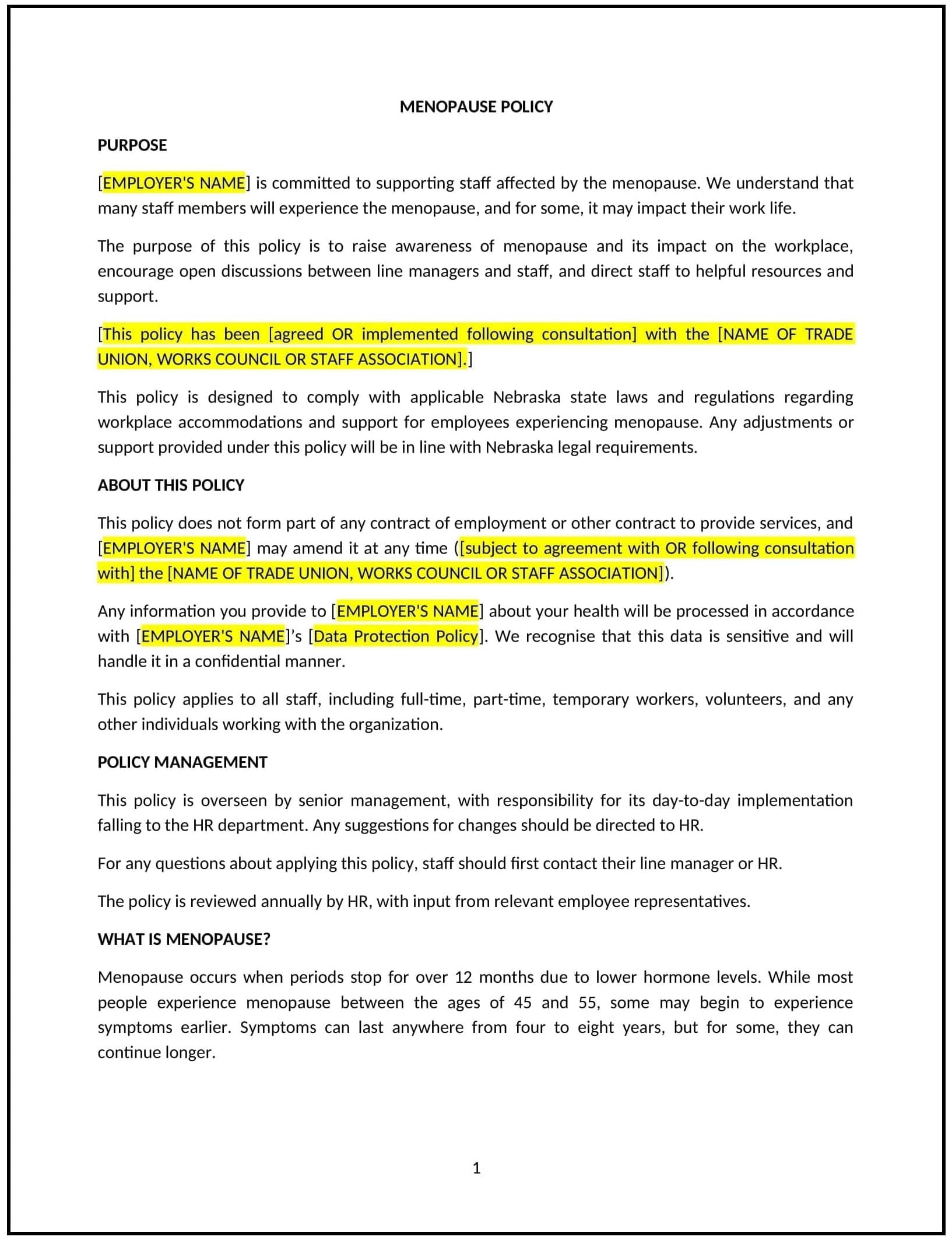Got contracts to review? While you're here for policies, let Cobrief make contract review effortless—start your free review now.

Customize this template for free
Menopause policy (Nebraska)
A menopause policy helps Nebraska businesses create a supportive environment for employees experiencing menopause-related symptoms. This policy outlines the steps the company will take to accommodate employees, raise awareness about menopause, and promote well-being in the workplace. It includes guidelines for providing flexibility, offering support, and reducing stigma related to menopause, ensuring that employees feel valued and understood during this life stage.
By adopting this policy, businesses in Nebraska can create a more inclusive, supportive workplace that promotes health, productivity, and employee retention, while addressing the needs of employees experiencing menopause.
How to use this menopause policy (Nebraska)
- Define menopause and related symptoms: Clearly define menopause and its stages, including perimenopause and postmenopause, and highlight the symptoms that employees may experience, such as hot flashes, fatigue, mood swings, and memory issues. Clarify that these symptoms can vary greatly from person to person.
- Provide workplace accommodations: Specify the types of accommodations that the business will offer employees who are experiencing menopause symptoms. This may include flexible working hours, the ability to work from home, access to cool spaces, or adjustments to the work environment to support comfort and well-being.
- Offer support and resources: Provide information on available support services, such as Employee Assistance Programs (EAPs), mental health support, or menopause-related resources. Encourage employees to seek support when needed and ensure confidentiality around their requests.
- Promote awareness and reduce stigma: Encourage open discussions around menopause, normalize the experience, and reduce stigma. Provide training for managers and employees to increase understanding of menopause and how it can affect employees’ health and performance.
- Ensure privacy and respect: Emphasize the importance of privacy and confidentiality for employees who request accommodations or support related to menopause. Employees should feel comfortable discussing their needs without fear of judgment or discrimination.
- Support flexibility: Outline flexible work options, such as adjusting schedules, taking additional breaks, or modifying job duties where necessary. Flexibility can help employees manage symptoms more effectively and maintain productivity.
- Create a supportive culture: Foster a workplace culture where employees feel supported in managing menopause. This may include having discussions around the topic in wellness programs, offering wellness workshops, or creating peer support networks for employees going through similar experiences.
- Review and update the policy: Periodically review the policy to ensure that it remains effective and relevant. Adjust the policy based on feedback from employees or any changes in Nebraska state law or federal regulations regarding health and workplace accommodations.
Benefits of using this menopause policy (Nebraska)
This policy provides several benefits for Nebraska businesses:
- Supports employee well-being: By providing accommodations and resources, businesses can help employees manage menopause symptoms effectively, contributing to better overall health and well-being.
- Enhances workplace productivity: A supportive environment enables employees experiencing menopause to perform at their best, reducing the potential negative impacts on their work performance.
- Promotes inclusivity: A menopause policy helps normalize menopause in the workplace and demonstrates the company’s commitment to inclusivity, diversity, and gender equity.
- Reduces stigma and increases morale: By openly discussing menopause and offering support, businesses can reduce stigma around this life stage, improving morale and employee satisfaction.
- Attracts and retains talent: Businesses that offer supportive policies are more likely to attract and retain top talent, especially among older workers who may be experiencing menopause.
- Improves employee retention: Offering a supportive, understanding environment for employees experiencing menopause reduces the risk of them leaving the workforce due to discomfort or the need for adjustments.
Tips for using this menopause policy (Nebraska)
- Communicate the policy clearly: Ensure that all employees are aware of the menopause policy, including during onboarding and through internal communications. Make the policy easily accessible for employees who may need it.
- Train managers: Train managers and HR professionals on how to support employees going through menopause. This training should include how to manage performance with sensitivity, respect, and fairness, and how to handle requests for accommodations.
- Create a confidential process for requests: Establish a confidential, respectful process for employees to request accommodations or support related to menopause. Employees should feel comfortable discussing their needs with HR or their supervisor without fear of discrimination.
- Offer ongoing support: Ensure that employees have continuous access to support services, such as EAPs, and encourage them to take advantage of these resources. Follow up with employees who have made requests for accommodations to ensure they are receiving the necessary support.
- Evaluate the policy’s effectiveness: Regularly assess how well the policy is working, gather feedback from employees, and make necessary adjustments to better support their needs.